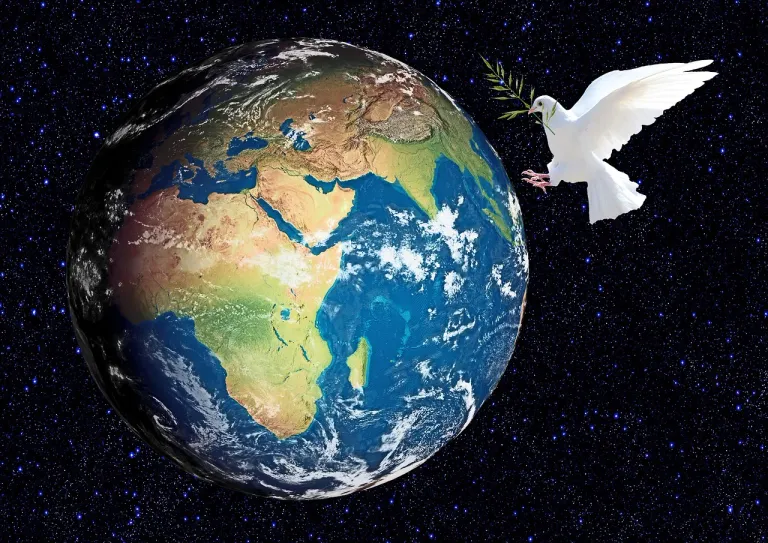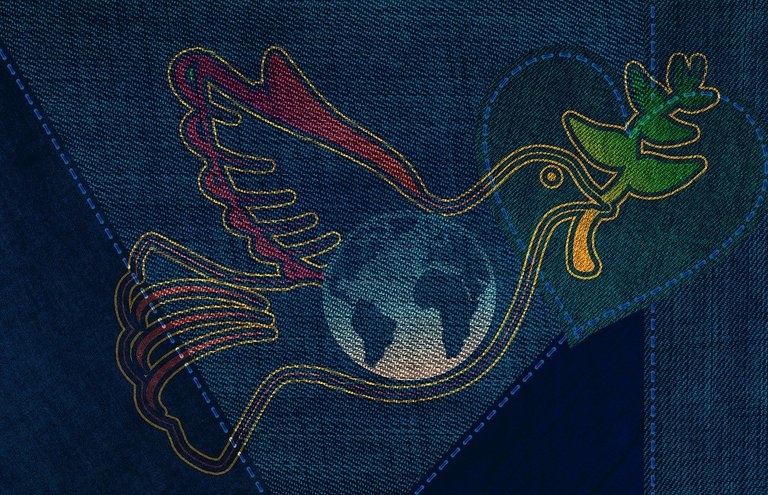The peace formula - Bhagavad Gita ch5:29
Of all the ancient Sanskrit texts known to us, probably the most famous and popular is this Bhagavad Gita, which is spoken by Krishna. And in this last text of chapter five, Krishna gives the formula for world peace.

The solution is simple. Know that you're not the controller, find out who is the supreme controller and perform all your activities for their pleasure.
Many who are familiar with the ancient texts are aware of the mighty god Shiva, who is known as Maheshvara. Maha means great and Ishvara means controller or master or proprietor.
But did you know that in this particular text of the Gita, it is Krishna who declares himself to be Maheshvara, the master of not only this world, but all the worlds, including that of Shiva.
More importantly, the bottom line is that we are certainly not the master and controller of anything, not even our own minds and senses, what to speak of this material world. That title belongs to the gods.
Whether you see Shiva or Krishna as Maheshvara is up to you and your knowledge of the ancient texts. But one thing is certain. We will never attain peace in this material world if we compete among ourselves for the title of master and controller.
At best we may temporarily be master of our little field, our patch of land. A king may feel he is master of his country. Yet who among us can say that they have mastered even their own senses? Who has mastered old age, disease and death? No one.
We are all humbled by the slow collapse of our own mind and body as we approach our final days. Only the Fool with inflated ego thinks that they are the master for a time.
And these little masters compete among each other for dominance and control of resources, which is why we fail to keep the peace. It's why we'll never have peace...
Until we give up this illusion of proprietorship and acknowledge Maheshvara as the one in charge, we'll always be at war with each other.
Today we may still have some degree of theism, despite our secular governments. But sadly we still fight, as nations, as communities, about who is Maheshvara, who is the top God. Some say the God of their language is chief, and the name is Allah, or Shiva or Krishna or Yaweh. But this is a battle of semantics and linguistics.
Amy intelligent person with just a fraction of true insight will conclude that there is ultimately only one supreme controller over everything, and that we simply address that person by different names according to our different languages.
Ultimately the one is master of the many. The one source is the origin of everything. It's so simple and obvious, yet still to this day our most intelligent and educated people continue to fight over it.
Who can make sense of this madness? How bewildered we seem to be as a human race. It's because as individuals we still cling to the egocentric illusion that we are the master and controller. Until we grow out of this childish misconception, we will remain in conflict with each other.
All we need to do is put the one master and controller in the centre of everything we do, and everything else will fall into place. Even then we may fight like blind folks all grasping different parts of the same elephant and conflicting in their descriptions and who is right.
So if you want it, it's yours. Are you mature enough to accept it and take it? Peace is the foundation of not only a happy world, but also the gateway to liberation at death. One needs to first be at peace with the world and then with oneself, in order to then meditate on transcendence. Paradoxically, when seeking peace, a troubled mind need only practice a moment's meditation in order to attract or embody that peace. Mood follows form.
Until then the little controllers will battle it out among themselves, will go to war for their version of the Supreme controller, when all along they are talking about the same person with different names and manifestations, indicating that their insight regarding the original controller is naïve at best, or more likely a substitute for their attempt at putting themselves up as controller of all they survey as ego gets in the way.

Bhagavad Gita ch5:29
भोक्तारं यज्ञतपसां सर्वलोकमहेश्वरम् ।
सुहृदं सर्वभूतानां ज्ञात्वा मां शान्तिमृच्छति ॥ २९ ॥
bhoktāraṁ yajña-tapasāṁ
sarva-loka-maheśvaram
suhṛdaṁ sarva-bhūtānāṁ
jñātvā māṁ śāntim ṛcchati
SYNONYMS
bhoktāram—beneficiary; yajña—sacrifices; tapasām—of penances and austerities; sarva-loka—all planets and the demigods thereof; maheśvaram—the Supreme Lord; suhṛdam—benefactor; sarva—all; bhūtānām—of the living entities; jñātvā—thus knowing; mām—Me (Lord Kṛṣṇa); śāntim—relief from material pangs; ṛcchati—achieves.
TRANSLATION
The sages, knowing Me as the ultimate purpose of all sacrifices and austerities, the Supreme Lord of all planets and demigods and the benefactor and well-wisher of all living entities, attain peace from the pangs of material miseries.
PURPORT
The conditioned souls within the clutches of illusory energy are all anxious to attain peace in the material world. But they do not know the formula for peace, which is explained in this part of the Bhagavad-gītā. The greatest peace formula is simply this: Lord Kṛṣṇa is the beneficiary in all human activities. Men should offer everything to the transcendental service of the Lord because He is the proprietor of all planets and the demigods thereon. No one is greater than He. He is greater than the greatest of the demigods, Lord Śiva and Lord Brahmā. In the Vedas the Supreme Lord is described as tam īśvarāṇāṁ paramaṁ maheśvaram. Under the spell of illusion, living entities are trying to be lords of all they survey, but actually they are dominated by the material energy of the Lord. The Lord is the master of material nature, and the conditioned souls are under the stringent rules of material nature. Unless one understands these bare facts, it is not possible to achieve peace in the world either individually or collectively. This is the sense of Kssna consciousness: Lord Kṛṣṇa is the supreme predominator, and all living entities, including the great demigods, are His subordinates. One can attain perfect peace only in complete Kṛṣṇa consciousness.This Fifth Chapter is a practical explanation of Kṛṣṇa consciousness, generally known as karma-yoga. The question of mental speculation as to how karma-yoga can give liberation is answered herewith. To work in Kṛṣṇa consciousness is to work with the complete knowledge of the Lord as the predominator. Such work is not different from transcendental knowledge. Direct Kṛṣṇa consciousness is bhakti-yoga, and jñāna-yoga is a path leading to bhakti-yoga. Kṛṣṇa consciousness means to work in full knowledge of one's relationship with the Supreme Absolute, and the perfection of this consciousness is full knowledge of Kṛṣṇa, or the Supreme Personality of Godhead. A pure soul is the eternal servant of God as His fragmental part and parcel. He comes into contact with māyā (illusion) due to the desire to lord it over māyā, and that is the cause of his many sufferings. As long as he is in contact with matter, he has to execute work in terms of material necessities. Kṛṣṇa consciousness, however, brings one into spiritual life even while one is within the jurisdiction of matter, for it is an arousing of spiritual existence by practice in the material world. The more one is advanced, the more he is freed from the clutches of matter. The Lord is not partial toward anyone. Everything depends on one's practical performance of duties in an effort to control the senses and conquer the influence of desire and anger. And, attaining Kṛṣṇa consciousness by controlling the above-mentioned passions, one remains factually in the transcendental stage, or brahman-nirvāṇa. The eightfold yoga mysticism is automatically practiced in Kṛṣṇa consciousness because the ultimate purpose is served. There is gradual process of elevation in the practice of yama, niyama, āsana, pratyāhāra, dhyāna, dhāraṇā, prāṇāyāma, and samādhi. But these only preface perfection by devotional service, which alone can award peace to the human being. It is the highest perfection of life.
Thus end the Bhaktivedanta Purports to the Fifth Chapter of the Śrīmad-Bhagavad-gītā in the matter of Karma-yoga, or Action in Kṛṣṇa Consciousness
Reference: Bhagavad Gita As It Is, translation and commentary by Swami A C Bhaktivedanta, original MacMillan 1972 edition.
Image: https://pixabay.com/illustrations/dove-peace-world-symbol-hope-
This post has been manually curated by @bhattg from Indiaunited community. Join us on our Discord Server.
Do you know that you can earn a passive income by delegating to @indiaunited. We share more than 100 % of the curation rewards with the delegators in the form of IUC tokens. HP delegators and IUC token holders also get upto 20% additional vote weight.
Here are some handy links for delegations: 100HP, 250HP, 500HP, 1000HP.
100% of the rewards from this comment goes to the curator for their manual curation efforts. Please encourage the curator @bhattg by upvoting this comment and support the community by voting the posts made by @indiaunited..
This post received an extra 18.19% vote for delegating HP / holding IUC tokens.
Jay Shree Krishna.... Har har mahadev 🙏🕉️
Hare Kṛṣṇa
Radhe Shyam